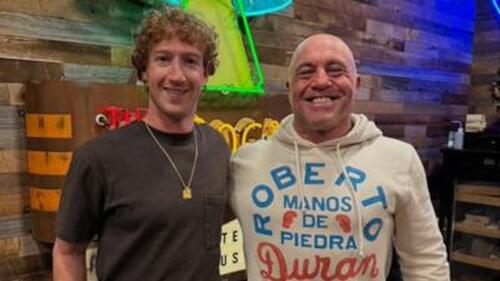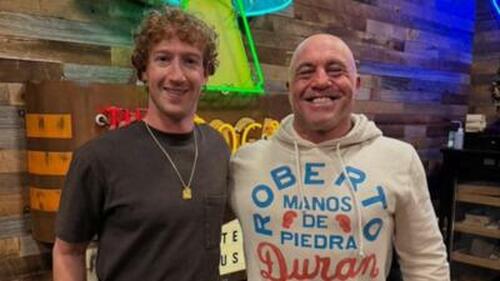Trump “Wants America To Win”: Zuckerberg Warns Of “Emasculated” Society
Authored by Nathan Worcester via The Epoch Tim,es,
Meta founder Mark Zuckerberg appeared on actor and martial artist Joe Rogan’s podcast on Jan. 10, sparking interest days ahead of President-elect Donald Trump’s inauguration.
The episode on “The Joe Rogan Experience” was aired just days after the tech founder announced his company was changing its moderation policy, replacing fact checkers with a less censorious system modeled on X’s Community Notes. He has also elevated Ultimate Fighting Championship CEO Dana White, a Trump and Rogan ally, to Meta’s board of directors.
During the nearly three-hour episode, Zuckerberg and Rogan talked Trump, online censorship, the recent election, television versus. podcasts, and the emasculation of society.
Trump ‘Wants America to Win’: Zuckerberg
Zuckerberg praised Trump on Rogan’s program, drawing a contrast between his prospective leadership and how the Biden administration handled the tech industry.
“I think he just wants America to win,” Zuckerberg said of Trump.
He also voiced regret for complying with requests to censor content on ideological grounds, particularly content related to COVID-19 while the Biden administration was pushing for COVID-19 vaccine uptake. He traced the rise of ideological censorship online to Trump’s election in 2016, which came alongside Brexit, and to the 2020 pandemic.
“We did generally defer to the government on some of these policies that in retrospect I probably wouldn’t, knowing what I know now,” he said.
“These people from the Biden administration would call up our team and like scream at them and curse,” Zuckerberg said.
The Facebook founder said that the United States should do more to defend its tech companies in other countries, citing legal actions by the European Union (EU) against Meta and other tech giants. He said the U.S. government had set the stage for other governments to intervene through its own approach to Meta and other firms.
The Election Made a Mark
Zuckerberg told Rogan that the 2024 election had affected Meta’s approach to content moderation.
“The good thing about doing it after the election is you get to take this cultural pulse,” he said. “We try to have policies that reflect mainstream discourse.”
Yet, he pushed back against claims that there was a particular significance to the timing, which coincides with other moves from Zuckerberg seemingly aimed at gaining support from the incoming administration—for example, Meta’s donation of $1 million to the Trump inaugural fund.
“I try not to change our content rules right in the middle of an election either. There’s not like a good time to do this,” Zuckerberg said.
Zuckerberg Talks Tradeoffs in Content Moderation
The Meta CEO spoke about his company’s decision to shut down its fact-checking program in favor of an X-style system in which users generate notes and vote them up or down.
He also drew attention to a related change—namely, the move to require more confidence from the company’s artificial intelligence-based systems before harmful content is removed.
A Jan. 7 announcement from Meta suggested the current approach is producing too many false positives, leading to “the vast majority of the censorship on our platforms.”
It stated that the systems will concentrate on “illegal and high-severity violations, like terrorism, child sexual exploitation, drugs, fraud, and scams” rather than the political content that was often flagged in the past.
On Rogan’s program, Zuckerberg said that there was a tradeoff between precision and comprehensiveness. A more aggressive system for spotting drug-related content, for example, might catch more of that material while sweeping up many innocent posts in its dragnet. On the other hand, a more precise system might catch less of that targeted content while censoring fewer innocent posts.
“We will maybe take down a smaller amount of the harmful content, but it will also mean that we’ll dramatically reduce the amount of people whose accounts were taken off for a mistake—which is just a terrible experience,” Zuckerberg said.
‘I Hated Doing TV’: Zuckerberg
Zuckerberg discussed his early media appearances after founding Facebook in 2004 while a student at Harvard University. Like Microsoft founder Bill Gates, Zuckerberg dropped out of Harvard.
“I hated doing TV,” he told Rogan. “I’d get super nervous.”
He recalled that, as a college-aged techie, he was “good at coding” but “real bad at kind of like talking to people.”
Zuckerberg said that the media outlets that hosted him would reduce his appearances to unflattering sound bites. He suggested that online podcasts succeed because they operate without those constraints.
“On the Internet, there’s no reason to cut it to a four-minute sound bite,” he said.
Rogan agreed.
“Conversations are like a dance,” he said. “You kind of have to find the rhythm that you’re going to talk with, and then you have to actually be interested in what you’re talking about.”
Zuckerberg Warns of ‘Neutered or Emasculated’ Society
Zuckerberg also discussed his martial arts training. The Meta CEO practices Brazilian jiu-jitsu.
“It definitely takes the edge off things. After a couple of hours doing that in the morning, it’s just like, yeah, it’s like nothing else that day is going to stress you out that much,” he said.
Zuckerberg reflected on society as a whole, saying much of it has become “neutered or emasculated.”
He said martial arts allows him to express himself in a way that isn’t possible as the CEO of a large company, comparing the visuals of him fighting favorably to the brief sound bites he can provide through TV interviews.
“When people see me competing in this sport, they say, ‘Oh, no, that’s the real Mark,’” he said.
Tyler Durden
Sat, 01/11/2025 – 17:30


